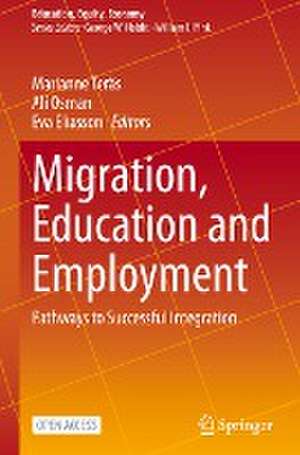Migration, Education and Employment: Pathways to Successful Integration: Education, Equity, Economy, cartea 10
Editat de Marianne Teräs, Ali Osman, Eva Eliassonen Limba Engleză Hardback – 14 oct 2023
Preț: 423.84 lei
Nou
Puncte Express: 636
Preț estimativ în valută:
81.11€ • 84.37$ • 66.96£
81.11€ • 84.37$ • 66.96£
Carte tipărită la comandă
Livrare economică 14-28 aprilie
Preluare comenzi: 021 569.72.76
Specificații
ISBN-13: 9783031419171
ISBN-10: 3031419170
Ilustrații: VIII, 203 p. 5 illus.
Dimensiuni: 155 x 235 mm
Greutate: 0.48 kg
Ediția:1st ed. 2024
Editura: Springer International Publishing
Colecția Springer
Seria Education, Equity, Economy
Locul publicării:Cham, Switzerland
ISBN-10: 3031419170
Ilustrații: VIII, 203 p. 5 illus.
Dimensiuni: 155 x 235 mm
Greutate: 0.48 kg
Ediția:1st ed. 2024
Editura: Springer International Publishing
Colecția Springer
Seria Education, Equity, Economy
Locul publicării:Cham, Switzerland
Cuprins
1. Introduction: Integration in and through Education and Employment.- PART I THE SWEDISH CONTEXT.- 2. Migrants Successfully Accessing their Vocation in Sweden: The Significance of Labour Market Initiatives to Facilitate the Integration.- 3. Understanding Recognition of Prior Learning as a Tool for the Labour Market Integration of Skilled Migrants.- 4. Potential, Actuality or Vulnerability? The Importance of Recognition in Career Counselling for Newly Arrived Migrants.- 5. Important Encounters for Education and Employment.- 6. Education for Access to The Swedish Labour Market and Society: A Historical Comparison of Practices for the Integration of Immigrants in the 1960s and Early 2000s.- 7. Integration as a Conceptual Resource When Studying Skilled Migrants in the Workplace.- 8. Integration and the Art of Making a Society – The Case of Swedish Society.- PART II THE SWISS AND NORWEGIAN CONTEXTS.- 9. Successful Integration of Refugees in Vocational Education and Training: Experiences from a New Pre-Vocational Programme.- 10. ‘Open Sesame’: Skilled Immigrants’ Experiences with Bridging Programmes in the Validation Process in Norway.- 11. Multicultural Perspectives in Driving Instructor Education and Driving Schools for Professional Drivers in Norway.- 12. Concluding Remarks.
Notă biografică
Marianne Teräs is Professor of Education in the Department of Education, Stockholm University, Sweden During the last 20 years, she has studied migration from the perspective of vocational education and training both in Finland and in Sweden. She led the research project focusing on integration and inclusion of migrants in and through vocation and work. The project was funded by The Swedish Research Council for Health, Working Life and Welfare.
Ali Osman is Associate Professor in the Department of Education, Stockholm University, Sweden. He has studied questions concerning migration over 25 years from various perspectives. He has studied multicultural discourses in adult education, migration and recognition of prior learning, school segregation and transitions between different educational systems and working life.
Eva Eliasson is Senior Lecturer in Educational Science in the Department of Education, Stockholm University, Sweden. She has studied vocational and teacher knowledge, especially in health care education, and the interplay between power relations and vocational knowledge. Her recent study focused on how skilled migrants in Sweden gain access to their previous vocation.
Textul de pe ultima copertă
This is an open access book which focuses on different aspects of education, employment, and successful integration of migrants in three countries: Norway, Sweden, and Switzerland. The chapters in this book reflect on these issues from micro, meso and macro perspectives; some are based on interviews with migrants and people who work with them, others on documents and literature about migration. There are different pathways for skilled migrants to vocations. Some start working in their previous vocations after arriving in the new environment. Some re-enter their professions but on a lower level. Some can re-train themselves in a new vocation, and some will go to further education, as studies in different chapters of this book suggest. Common for successful integration seems to be several intertwined factors: the target language competence, strong motivation and agency, supporting networks and supporting persons, as well as structural opportunities of the new environment. The book’s editorial board takes an eclectic view, hoping to start an academic debate about what ‘successful integration’ means. While discussions about the integration of migrants tend to focus on integration failures, there are millions of migrants, in different countries, who have successfully integrated into their new societies.
Caracteristici
Focuses on social justice as a key factor of democratic social policies Illustrates global issues such as migration, integration, and recognition of immigrants' skills and educational level Combines discussion of theories and empirical studies Covers both first and second generation immigrants, integration to education and working life in their new countries This book is open access, which means that you have free and unlimited access









